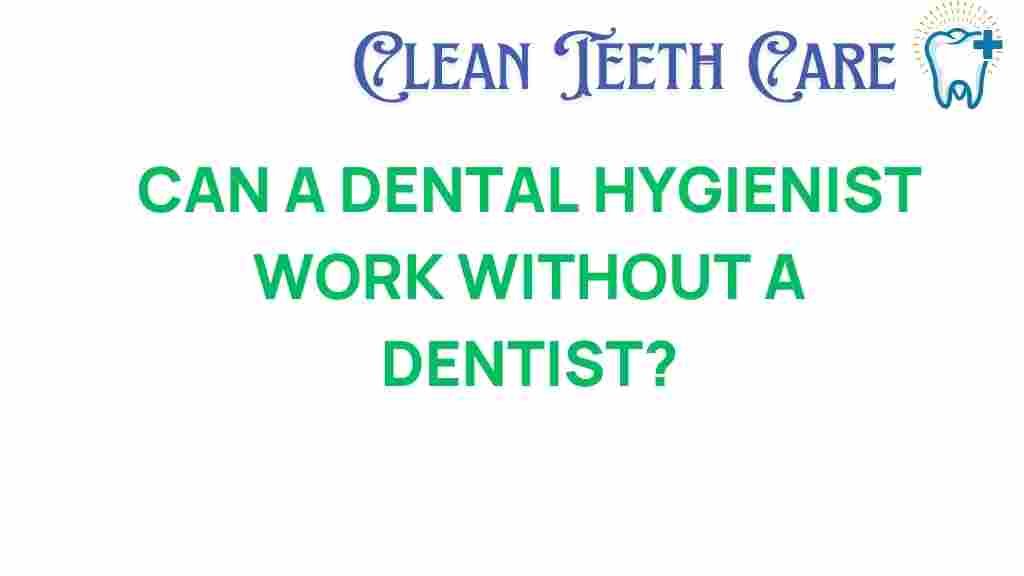Can a Dental Hygienist Thrive Independently of a Dentist?
The role of a dental hygienist has evolved significantly over the years, leading to a growing interest in the possibilities of independent practice. With a focus on oral health and patient care, many dental hygienists are exploring ways to provide comprehensive dental care without the direct supervision of a dentist. This article will delve into the potential for dental hygienists to thrive independently, the challenges they may face, and the regulatory landscape that governs their practice.
Understanding the Role of a Dental Hygienist
A dental hygienist is a licensed professional who specializes in preventive oral care. Their primary responsibilities include:
- Performing teeth cleanings and prophylaxis
- Taking and developing dental radiographs (X-rays)
- Applying preventive materials to the teeth, such as sealants and fluoride
- Educating patients on oral hygiene practices
- Assessing patients’ oral health and reporting findings to dentists
While traditionally working under the supervision of a dentist, some states and countries allow dental hygienists to practice autonomously. This shift toward professional autonomy raises important questions about the viability of independent practice.
Can Dental Hygienists Practice Independently?
The ability of a dental hygienist to practice independently varies significantly based on local healthcare regulations. In some regions, dental hygienists can establish their own practices, while in others, they may still need to operate under the supervision of a dentist. Here’s a breakdown of factors influencing independent practice:
- State Regulations: Different states have different laws regarding the scope of practice for dental hygienists. Some states allow for full independent practice, while others require supervision or collaborative agreements with dentists.
- Education and Training: Dental hygienists must have the appropriate education and training to provide independent care. Most require an associate’s degree in dental hygiene, and additional certifications may be necessary for certain procedures.
- Business Skills: Successful independent practice requires strong business acumen, including marketing, finance, and management skills.
To understand if independent practice is possible in your area, it’s crucial to research local laws and consult with professional organizations.
Benefits of Independent Practice for Dental Hygienists
Transitioning to an independent practice can offer numerous advantages for dental hygienists. These benefits include:
- Increased Autonomy: Independent practice allows dental hygienists to make decisions about patient care without needing a dentist’s approval.
- Flexible Work Hours: Hygienists can set their own schedules, allowing for a better work-life balance.
- Direct Patient Relationships: With independent practice, dental hygienists can foster closer relationships with their patients, enhancing the patient care experience.
- Increased Earning Potential: By managing their own practice, hygienists may have the opportunity to increase their earnings compared to working as an employee.
Challenges Faced by Independent Dental Hygienists
While the idea of independent practice is appealing, there are challenges that dental hygienists must navigate:
- Regulatory Compliance: Adhering to healthcare regulations is critical. Hygienists must stay informed about local laws and ensure compliance to avoid legal issues.
- Insurance and Liability: Independent practice means managing your own malpractice insurance, which can be costly and complicated.
- Business Management: Many hygienists may not have experience in running a business, which can lead to operational difficulties.
- Lack of Referrals: Without a dentist to refer patients, independent hygienists may struggle to build a patient base.
Steps to Establish an Independent Dental Hygiene Practice
If you’re considering launching an independent practice as a dental hygienist, follow these steps:
- Research Local Regulations: Understand the laws governing independent dental hygiene practice in your state or country.
- Develop a Business Plan: Outline your services, target market, budget, and marketing strategy.
- Obtain Necessary Licenses: Ensure you have the appropriate licenses and certifications to practice independently.
- Secure Funding: Determine how you will finance your practice, whether through personal savings, loans, or investors.
- Find a Location: Choose a location that is accessible to your target demographic and complies with zoning laws.
- Market Your Services: Utilize social media, local advertising, and networking to attract patients.
- Build Relationships: Network with other healthcare professionals for referrals and collaborative opportunities.
Troubleshooting Common Issues in Independent Practice
Starting an independent dental hygiene practice may come with unexpected challenges. Here are some troubleshooting tips:
- Low Patient Turnout: If you’re struggling to attract patients, consider enhancing your marketing efforts or offering promotions to draw in new clients.
- Insurance Issues: Ensure that you are in-network with major insurance providers to increase patient access to your services.
- Compliance Problems: Regularly review local regulations and seek legal advice if you’re unsure about compliance issues.
- Financial Strain: Keep a close eye on your cash flow and consider consulting a financial advisor to manage your finances effectively.
The Future of Independent Dental Hygiene Practices
The landscape of the dental industry is changing, with a growing recognition of the value that dental hygienists bring to patient care. As more states allow for independent practice, the future looks promising for hygienists seeking autonomy.
Moreover, the increasing emphasis on preventive care and oral health education aligns perfectly with the skills of dental hygienists. As they establish themselves as primary providers of preventive dental care, they may become key players in improving community health.
Conclusion
In conclusion, a dental hygienist can thrive independently of a dentist, provided they navigate the healthcare regulations and business challenges effectively. With the right preparation, education, and entrepreneurial spirit, dental hygienists can build successful independent practices that contribute significantly to oral health and patient care.
For those interested in pursuing this path, it’s essential to stay informed, seek mentorship, and continuously enhance both clinical and business skills. The independent practice of dental hygiene not only benefits practitioners but also ultimately serves the communities they care for.
To learn more about the future of dental hygiene and independent practices, visit this informative resource.
For additional resources on dental hygiene regulations, check out this external link.
This article is in the category Conditions and created by CleanTeethCare Team
